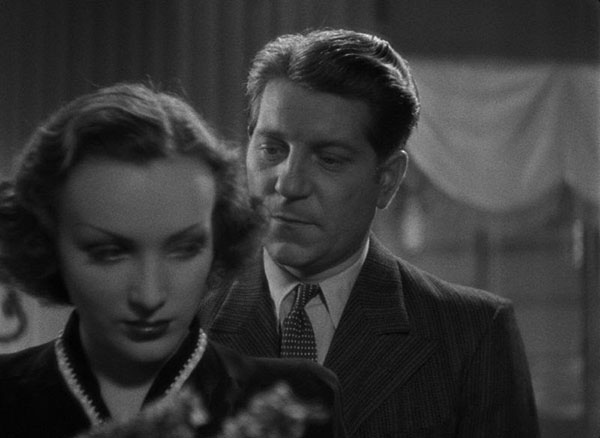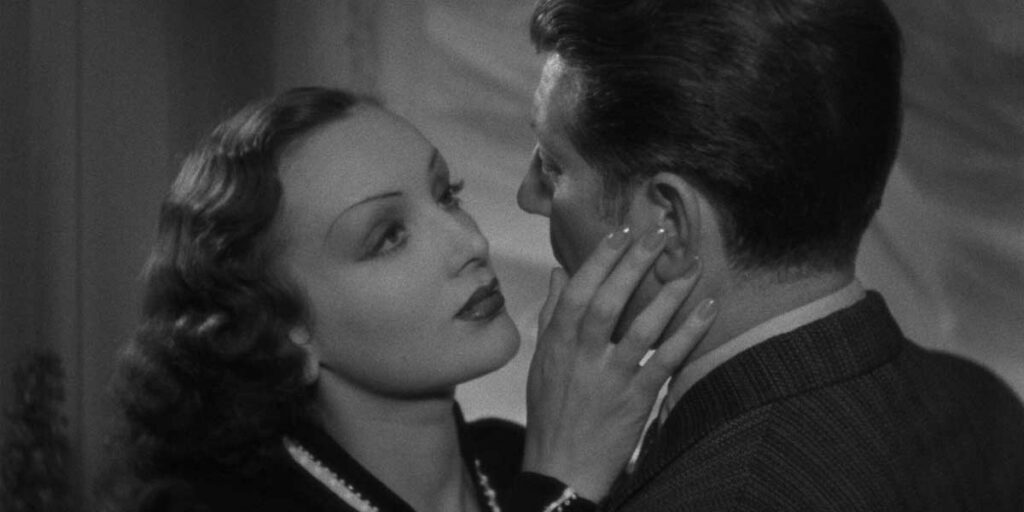Lady Killer is a solid, well-acted drama of the ultimate romantic disillusionment from one of the most underappreciated French directors outside of France.
A popular libertine and heart-breaker is given the taste of his own medicine (or, perhaps, more appropriately in this case, love potion) in Jean Grémillon’s underseen film Lady Killer. Eminent French star Jean Gabin (The Grand Illusion) is in the role of dashing Spahi Officer Lucien Bourrache, who is used to leaving behind a trail of broken hearts and unanswered love letters, and hence his nickname – “Gueule d’amour”. All this is until he meets and falls in love with Madeleine Courtois (Mireille Balin), a beautiful and enigmatic woman, who is also quite rich, thanks to her many male admirers. Smitten Lucien, who takes a blue-collar job in printing upon leaving the army, is prepared to do anything to be closer to his new love, especially now that he is in Paris, where his beloved also lives. However, as it turns out, Madeleine has her own priorities in life, and maintaining her luxurious lifestyle is one of them.
French cinema of the 1930s was all about the “poetic realism” movement, associated with such directors as Jean Renoir (The Rules of the Game), Marcel Carné (Hôtel du Nord) and Julien Duvivier (Pépé le Moko), and mixing lyricism, film noir styles, and working-class sensibilities. German-produced Lady Killer, based on a novel by André Beucler, follows just this trend, infusing stark realism with sophisticated art direction. And Jean Grémillon makes good use of the locations: Orange, Cannes (where Lucien first meets Madeleine) and Paris. And it is Paris, and, more particularly, Madeleine’s apartment, which becomes a battleground of a sort, where working-class Lucien, feeling bashful in the opulent environment, but still thinking he has won his Madeleine, has to navigate a tricky bourgeois home triangle consisting of Madeleine’s domineering mother (Marguerite Deval), her unscrupulous butler (Jean Aymé) and her powerful-through-money older lover (Robert Casa).
Jean Gabin exudes that low-key, Humphrey Bogart-style charm that means his presence alone speaks volumes and his suaveness goes a long way. The actor’s transition from a confident womaniser to a man desperate for a woman’s attention is a sight to behold. Mireille Balin, who reunites with Gabin after Pépé le Moko, is an equally compelling femme fatale, who is determined to put Lucien through all the dating hoops full of humiliation, while remaining perfectly unscathed herself. This trope of a promiscuous woman playing with her lover was a familiar one by that time in cinema. However, it is also interesting to note that Jean Grémillon reversed this unflattering portrayal of a woman in a number of his films, most notably in The Sky is Yours/The Woman Who Dared, which portrays a woman who breaks away from her assigned gender role and heroically pursues her dream of flying.

Lady Killer is not without its numerous phases of “tedious expectancy”, but moments of poignancy do peek through the cracks of the by-the-book film narrative which seems determined to keep the audience at the safe emotional distance from the characters. Jean Grémillon choreographs these poignant moments almost to a theatrical perfection and they emerge in all their glory just as the narrative halts in certain places to underline the irony of Lucien’s situation.
One example of such a moment of poignancy is the scene where Lucien returns to Orange, a town of his past soldierly duty, and perhaps still subconsciously expects to receive the same glorious treatment by the town’s people as he did when he was an irresistible young man in a uniform. He will be surprised to discover what time can show to a man who forgot it amidst his personal obsessions. In that scene, Lucien visits a café in Orange and we hear the news of a cavalry approaching. A crowd gathers outside to watch the marching men, but we do not see the cavalry, and only see their shadows on the ground. Perhaps, we cannot look at the cavalry because Lucien also finds it painful to look at the cavalry and recall his carefree past. We are then presented with a long shot of Lucien standing alone and abandoned in the café, as its proprietors ran outside to greet the dashing newcomers. Time is merciless.
The last twenty minutes of the film are probably the most intriguing, and this is where film noir fatalism emerges in the shape of a jealousy-laden love triangle as Lucien’s old friend, doctor René (René Lefèvre), re-enters the plot. Being jilted is a hard pill to swallow, but any sympathy which Jean Grémillon is trying to elicit for Lucien can only convince if the director also counts on the audience forgetting that Lucien himself probably hides a string of love conquests that have wronged many a woman and possibly with devastating consequences.
In our twenty-first century used to anti-heroes, but now also sensitive to female stereotypes, the intended tragedy of Lady Killer may appear more dubious than compelling, but the film still delivers a rewarding cinematic experience overall, and that thanks to Jean Grémillon’s thoughtful direction, and Jean Gabin and Mireille Balins’s fine turns as lovers at cross-purposes. Grémillon was undoubtedly a director of much subtlety and intelligence, and if Lady Killer is not quite a “real killer”, then it is definitely also something more than just a “fatalistic romance” time-filler.
Beginning Friday, August 4, a new 4K restoration of Jean Grémillon’s Lady Killer opens for a one-week NY exclusive theatrical engagement at Metrograph as part of “Jean Grémillon x2.”

